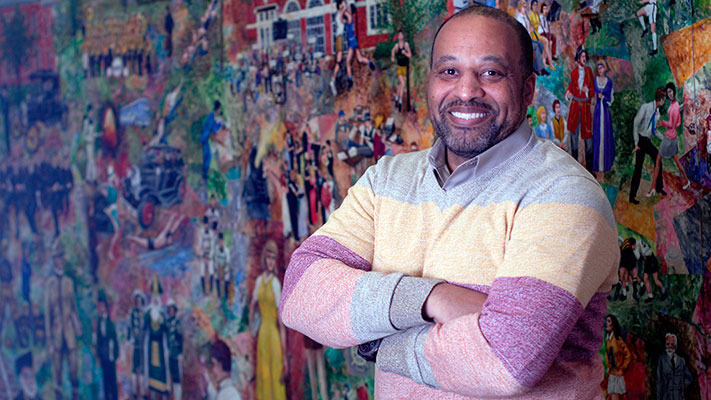
Steve Parks, a 1982 engineering management graduate, is director of diversity for Ameren Corp. in St. Louis. Photo by B.A. Rupert.
Steve Parks knows how hard it is to challenge and change the culture of a workplace. “You have to be patient,” he says. “Sometimes you have to go back and look at how things used to be so you can see the progress.”
As director of diversity for Ameren Corp. in St. Louis, Parks says his primary responsibility is “seeing that we drive inclusion throughout our company.”
Parks says that although employment opportunities may have improved for some, others continue to miss out. “Out in the community, you’ll see one woman for every male, but you could go into some businesses and you’ll see one female for every 10 males,” he says. “It’s the same thing for people with disabilities — there are absolutely more people with disabilities than we see represented in the workforce.”
At Ameren, Parks works to increase awareness of what people do — intentionally or unintentionally — to exclude others.
I tell students don’t set out to prove yourself to someone else — set out to improve yourself.”
“Our culture is so powerful that it sometimes makes us think certain behaviors are okay that really aren’t,” says Parks, who earned his degree in engineering management in 1982. “If everyone understood the pain we put on people who are excluded, I think most of us would say, ‘I need to stop doing that. I just didn’t know,’” he says.
He speaks from experience. The first in his family to attend college, Parks came to Missouri S&T through the Minority Engineering Program, which celebrates its 40th anniversary this year. The program was developed by professors and student representatives from the Association for Black Students to bring more minority students to the university through a scholarship program supported by industry. Today, the MEP mission is part of the office of student diversity, outreach and women’s programs.
“One of the most difficult days in my life was when my parents brought me to Rolla and dropped me off,” he says. “It was such a culture shock. I was left at a place with people who I didn’t know and who really didn’t want to know me.”
Parks says he struggled academically and had at least two instructors tell him that he wouldn’t graduate. “That’s when I decided, whatever it took, I was going to find a way,” he says.
Now a frequent speaker to Missouri S&T students, Parks says he doesn’t recommend using naysayers’ discouragement as motivation. “I tell students don’t set out to prove yourself to someone else — set out to improve yourself.”
He credits the MEP program, Lawrence George (retired assistant to the chancellor at S&T) and Alpha Phi Alpha for playing major roles in supporting him through his graduation.
“Our culture tells us about ourselves and sometimes, when we listen to it too much, we never get to know who we really are,” he says. “If I had been aware of its power over me when I was young, I would have made different choices. As powerful as culture is, we own it. So I tell students they need to take ownership of it and try to shape it, instead of letting it shape them.”
Parks worked in engineering for about 20 years before moving into the human resources field. Along with an MBA from Fontbonne University, he is a certified senior human resources professional, holds memberships in numerous professional organizations and serves on the Chancellor’s Advisory Committee on African American Recruitment and Retention. He and his wife, Dee, have six children and five grandchildren.
By Linda Fulps
Great words of wisdom! I have so much appreciated working with you as our members forward CACAARR’s missions. You continue to be on point and your dedication has been an ernomous impact in shaping our future!!
LaWanda Jones CE’91